Members of the New Hampshire House of Representatives Election Law Committee braved the snow to deliberate upon legislation on Tuesday. Here’s a recap of their day.
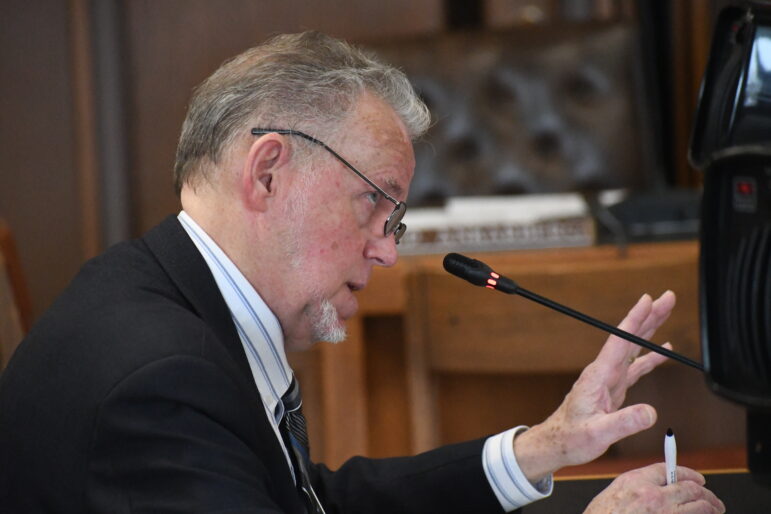
Public Hearings
This bill addresses wording on the ballot regarding how many votes for a specific race a voter receives.
Michael Cahill (D-Newmarket) is the bill’s only sponsor and admitted that it needs a little work.
The primary change in the bill would modify the words “vote for not more than” a certain number of candidates than “vote up to” a certain number of candidates. Cahill said the purpose of this stemmed from a large number of “undervotes” in Newmarket last year, or ballots where voters did not use all the votes they were entitled to use in a certain race.
He told the committee that he did not hear specific confusion from anyone in his town, but he had heard from moderators that there had been some confusion across the state.
Katherine Prudhomme O’Brien (R-Derry) noted that voters have the choice to not use all of their votes, and Cahill agreed, stating that this bill did not intend to dissuade people from voting a certain way, but instead aiming to avoid confusion.
Stephen Kennedy (R-Hudson) felt that the wording was complicated and other members of the committee said that alternate wording could potentially serve the same purpose.
Deputy Secretary of State Erin Hennessy said that she was willing to work with Cahill on grammatical errors in the bill and noted that there can be fatigue for voters on races down the ballot or in races with a significant amount of choices, like the 13 selections a voter has in Hudson.
Regarding online testimony as of Tuesday, there was one person in support of the bill and two people opposed.

This bill addresses candidate filing deadlines for state general elections.
Bill sponsor Alvin See (R-Loudon) said this bill was intended to address the issue of third-party candidates and independent candidates, who do not have primary elections in the same way under state law. Thus, he stated that it made no sense to place their filing deadlines at the same time frames as the major parties.
The committee had no questions for him.
Regarding online testimony as of Tuesday, there were two people in support of the bill and six people opposed.
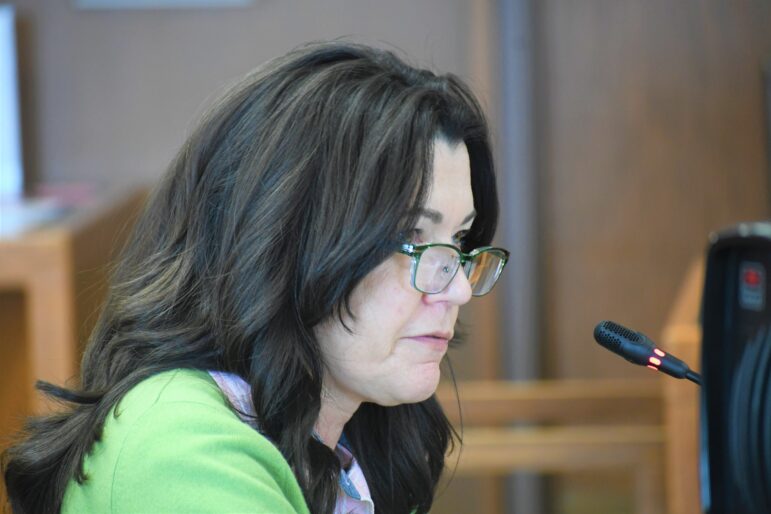
This bill allows one-time grants to be given to cities and towns for the purchase of election equipment.
Bill sponsor Laura Telerski (D-Nashua) said the funding would come through Help America Vote Act (HAVA) funds and said the state’s current Accuvote machines are reaching the end of their life span.
These grants could be used for other items in addition to replacements for the Accuvote machines.
Telerski added that many municipal budgets are stretched and have limited time to prepare for elections.
She said she would be open to an amendment setting a cap on grants given concerns from the Secretary of State’s office that the over $10 million in HAVA funding may not be available for when needed.
“These machines are not a want for towns, they are a need,” said Telerski.
Following a question from Ralph Boehm (R-Litchfield) over prioritization of grant funding, Telerski said she trusts the judgement of the Secretary of State and assumes priority would be given based on the number of machines needed and number of voters in each ward and precinct.
Vice Chair Ross Berry (R-Manchester) asked what a “secure” laptop is, with Telerski saying it is a municipally-owned laptop with safeguards against safety breaches. Berry asked if the word “secure” could be removed to avoid confusion and Telerski said he was open to the committee’s opinion on that.
Natch Grayes of the New Hampshire Municipal Association said his organization supports the bill.
In response to questions from Angela Brennan (D-Bow), Grayes estimated that the cost of the Accuvote systems would cost between $1.175 and $1.65 million statewide.
Prudhomme O’Brien asked about the fiscal impact if towns not using machines reaching the end of their life asked for grant funding. Grayes said that could modify the total amount needed, but it was unclear because the bill did not specify how the Secretary of State prioritize grant requests.
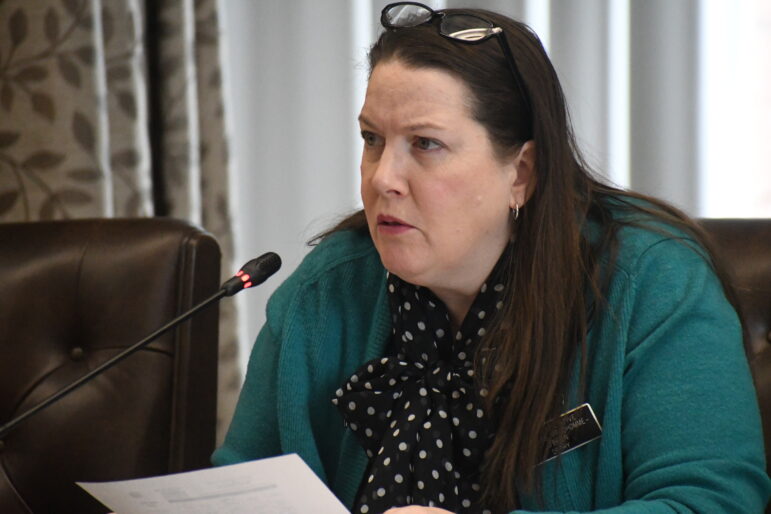
Olivia Zink of Open Democracy Action also spoke in favor of the bill. In response to a question of Brennan, Zink said that election workers would need to do a hand count of ballots if machines fail. Brennan also asked how long it would take in Manchester specifically in 2024 if machines failed. Zink said Manchester might be the wrong example since it has multiple machines, but larger municipalities with limited polling places like Bedford or Derry could face multi-hour delays.
Zink added that difficult election days, such as ones with stressful machine issues, could impact the ability to attract election day volunteers.
Mackenzie St. Germain of America Votes also spoke in favor of the bill. She noted some areas that still use Windows XP on its software and other places where machines actually melt during summer elections. She added that a lack of new machines, that could jeopardize same-night election results that New Hampshire have become known for.
New Hampshire Secretary of State Dave Scanlan spoke in opposition to the bill. He said it was urgent to replace ballot counting devices, but not as urgent as some of the testimony may have put it. He also said that other states that have drawn down their HAVA money have gone back to the federal government for additional funding. New Hampshire received $17 million in HAVA funds in 2003 to meet the requirements of HAVA, with the legislature asking that the Secretary of State’s office delay using all of that money as long as possible, with $12 million still remaining.
Scanlan added that some federal funding has been provided due to the COVID-19 pandemic, almost all of which was sent directly to cities and towns, but some of which was put toward record keeping. He said that a grant program would require significant record keeping as well.
He additionally added that voting machine purchasing decisions should be kept at the local level, with some municipalities find that certain systems and methods save their municipality money.
Scanlan concluded that if the original HAVA money was spent down, including interest payments on the original principal, the Secretary of State’s Office would require $1 million per year from the legislature.

Connie Lane (D-Concord) asked why this would be an issue given that only $2 or $3 million of the HAVA funds are being used. Scanlan said that one-time requests could be looked at, but he said that he believes the Secretary of State’s Office has done a good job remaining fiscally responsible to date.
Boehm asked how much the replacement machines cost, with Scanlan said that companies are looking to sell election systems instead of just machines, so negotiation may be needed.
See testified that towns were already aware of this and those towns that planned ahead should not be penalized for planning ahead.
Regarding online testimony as of Tuesday, there were 285 people in support of the bill and four people opposed.

This bill would allow political advertising containing the candidate’s name be removed by that candidate if it appears on public property.
Boehm said that this specifically references signs that are attacks on a candidate meant to impersonate candidate actually disparages them, and would allow those candidates to remove those signs.
“We all talk about fair elections, this isn’t fair,” he said.
Boehm said if this bill doesn’t pass, he will make his own comparable attack signs in future elections.
Regarding online testimony as of Tuesday, there was one person in support of the bill and one person opposed.
This bill would transform cast ballots into public documents.
Clayton Wood (R-Pittsfield) is not a sponsor of the bill, but introduced the ball and asked that it be moved forward for discussion.
Bill sponsor J.R. Hoell (R-Dunbarton) arrived later in the hearing due to a scheduling conflict and said that most ballots are anonymous, but people can double check that their ballots were counted by putting particular marks on the ballots that only they know. He said that this law does not apply to challenged ballots or those with non-anonymous ballots, adding that current law does not allow the public to look at filed-out ballots except during recounts.
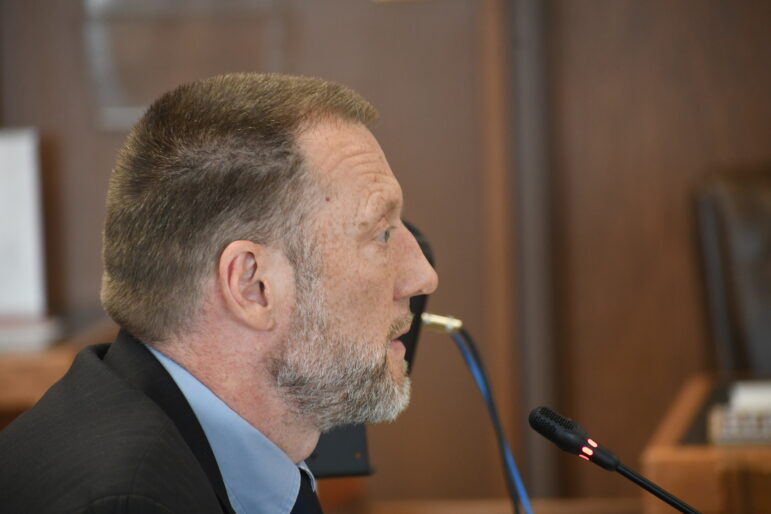
He added that people could do this already by requesting recounts and machines are coming into existence that can scan ballots and transform them quickly into .pdf files, making the process non-burdensome.
Brennan asked about the cost of the new ballot machines, and Hoell said he was unaware why there was no fiscal note attached to the legislation, but said election integrity related funding could be used.
Grayes said there are concerns with making ballots public records, given the potential for marking the ballots and the expense needed with making these ballots available. He added that this would not add anything to public’s right to know about government activities since they already know election results and the current public right to know law is about government activity, not citizen activity.
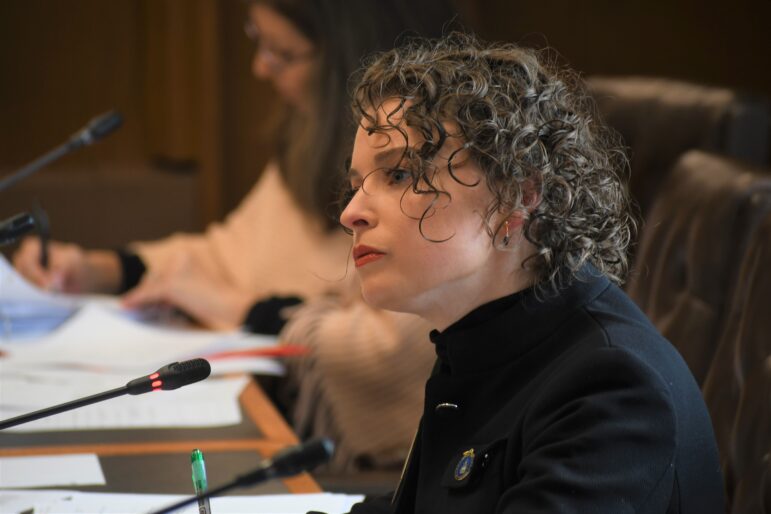
Brennan asked if citizens could already ask for these ballots under state law, with Grayes saying it was uncertain, as there are pending court cases relating to this topic. Grayes said that municipalities are required to comply with right-to-know requests, but they face challenges with larger requests.
Berry asked Grayes why anyone would care about defacement of ballots once elections and recounts have been made, and it was determined that it was a federal requirement to keep the ballots for 22 months. Berry asked if there was a “magical money tree” rather than HAVA funding, would that relieve the concerns, with Grayes saying the money could be better spent elsewhere.
Brennan asked Grayes of the New Hampshire Municipal Association had any concerns about the integrity of ballots given apps that can manipulate images. Grayes said the NHMA is more focused on process.
Grayes added that hand counted versus machine counted ballots could also complicate the process.
Hennessey she said the Secretary of State’s Office opposes the bill due to its language, specifically confusion over exemptions from the state’s public records law, a lack of discussion requiring the scanning machines Hoell mentioned and other wording inconsistencies.
Prudhomme O’Brien expressed concern over the lack of wording regarding the scanning machines and wondered if it would cause inconsistences in between towns.
Claudine Burham (R-Milton) asked if could help save money if scanned versions of ballots became required, with Hennessey saying that is a question for several years down the road when those machines become more prevalent.
In response to a question from Brennan, Hennessey said that the practice of marking ballots mentioned by Hoell could lead to ballot harvesting and privacy concerns.
Berry asked Hennessey about privacy concerns given that people take photos of ballots, and why ballots are stored for so long. Hennessey did not have answers for those questions. There was also a question from Berry regarding the cost of recounts that Hennessey did answer.
Ellen Read (D-Newmarket) spoke in favor of the bill, citing transparency.
Regarding online testimony as of Tuesday, there was 227 people in support of the bill and 119 people opposed.
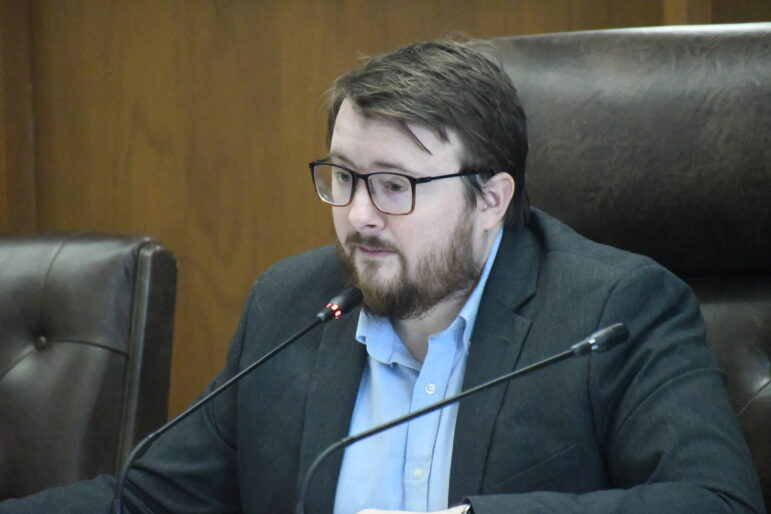
Executive Sessions
This bill addresses a variety of issues related to voter domiciles.
It will go to the full house without a recommendation, with an inexpedient to legislate (ITL) and an ought-to-pass (OTP) motion both ending in 10-10 deadlocks.
There were three substitutions for these two votes and all subsequent votes. Stephen Boyd (R-Hooksett) filling in for Aiden Ankerberg (R-Rochester), Jessica Lamontagne (D-Dover) filling in for Luz Bay (D-Dover) and Kris Schultz (D-Concord) filling in for David Cote (D-Nashua.)
Cote has not shown up in the state house for any committee hearings or session days yet this year.
This bill allows a member of a candidate’s campaign or local political party committee retrieve their political signs.
Prudhomme O’Brien called it a simple, non-partisan bill. It was recommended 20-0.
This bill addresses voting by out-of-state college students.
An ITL vote was recommended 20-0.
HB 415
While Berry said that the amendment offered by Read was a good start, he noted that it had just come in that morning and additional research was needed.
He also stated that another bill could serve as a better vehicle for the intention of the bill, reiterating that the argument for not making ballots public documents is paper thin after they have been counted and the period for recounts and legal challenges has been concluded.
Other members of the committee also reiterated concerns stated earlier in the day during the public hearing.
The Read amendment was not adopted by a 19-1 vote, with only Robert Wherry (R-Hudson) voting in favor. An OTP motion was not recommended 20-0 and an ITL motion was recommended 20-0 as well.
Postponments
HB 243, HB 224, and HB 316 were postponed until March 14.







